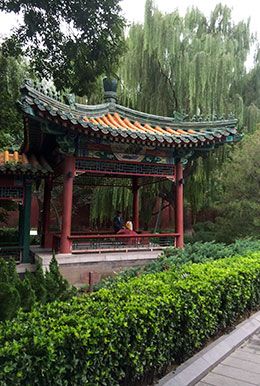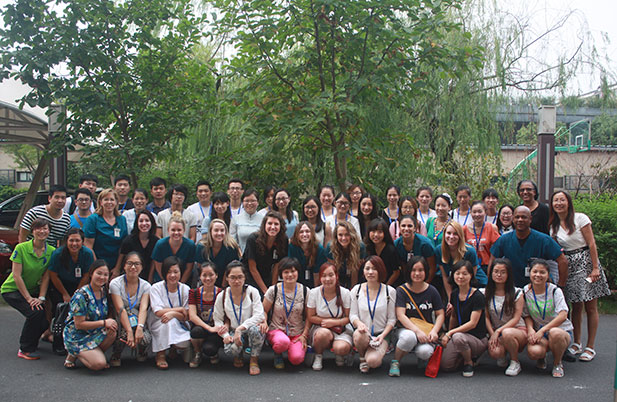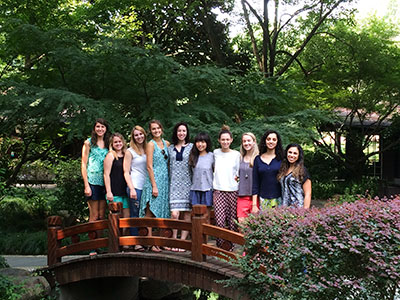China Revisited
Language Has No Bounds
By Courtney Haas

Mission trips make us think of playing with children, sharing Bible stories, building schools and churches and providing medical services all while experiencing a new culture. All of these things are true. All are equally important, but sometimes it is difficult to put ourselves in the mentality that we are meant to serve as missionaries. We think, “What can I offer? My skill is valuable in the United States, but is it something that I can share with a developing country and make a difference?”
Four years ago, the Loma Linda University School of Allied Health - Communication Sciences and Disorders (CMSD) took this thought into consideration. They established a successful mission opportunity for their students to experience service and share their clinically learned skills in a setting where they can leave a lasting impression. In this case, that place was the Children’s Hospital of Zhejiang University School of Medicine (ZUCH) located in Hangzhou, China.
The field of Speech Language Pathology is still considered a new specialty in China. Having only been in China about 20 years, there are less than 1,200 speech pathologists practicing today. To put it in perspective that is about one speech pathologist for every 1.3 million people.
CMSD associate professor and department chair Terry Douglas and clinical coordinator Janine Benner have spearheaded this mission over the years. After the fourth visit to ZUCH in September 2015, they saw the lasting effect their work had on the lives of those they connected with in China. They also saw the educational and professional mark they left on the lives of the students and staff who participated.
The trip consisted of a 13-member team made up of  professors, practicing professionals and CMSD graduate students. While there, they provided training, workshops, lectures, clinical services and accent modification. The topics addressed varied from assessment and treatment of child language disorders to the growing issue of Autism Spectrum Disorders. During the trip, Professor Benner and the graduate students also provided training and workshops for special education school staff and parents.
professors, practicing professionals and CMSD graduate students. While there, they provided training, workshops, lectures, clinical services and accent modification. The topics addressed varied from assessment and treatment of child language disorders to the growing issue of Autism Spectrum Disorders. During the trip, Professor Benner and the graduate students also provided training and workshops for special education school staff and parents.
Catherine Rowell, a member of the 2015 Speech Language Pathology team, shared that she valued most about her experience and speech pathology and the people she is blessed to work with.
“The resilience and bravery that sick kids and their caregivers exhibit has always blown me away and made me more aware of how I handle myself during hardship,” Rowell said. “ As I worked at the old campus hospital at ZUCH, I was deeply aware that communication disorders are still somewhat mysterious there. Despite that, the parents and hospital staff were so excited, so willing, to try whatever may work for each individual child while being open to new suggestions.”
“One of our primary concerns was the lasting impact,” Douglas shared. “We don’t want to just go and leave and everything goes back to the way it was. That is why we go to train them so that they can take the situation, assess the issue and address it even after we are gone.”
 With this in mind, the team does not go to China empty handed. They take materials, supplies and ideas. They go to provide innovative ideas for the hospital staff so that they can personally address various problems, such as autism. This disorder is a growing concern in China. However, the strict one-child per family policy makes it much more difficult for parents to know how to deal with this type of disorder.
With this in mind, the team does not go to China empty handed. They take materials, supplies and ideas. They go to provide innovative ideas for the hospital staff so that they can personally address various problems, such as autism. This disorder is a growing concern in China. However, the strict one-child per family policy makes it much more difficult for parents to know how to deal with this type of disorder.
“One of my passions is not only helping children but also educating and sharing information with the families because they spend the majority of their day with the child,” Benner shared. “Being able to show families how to connect and communicate with their child is one of the most wonderful and rewarding parts of our trips to ZUCH .”
Benner joined trip three years ago when Douglas realized that dealing with these types of disorders in the children’s hospital was where their work would be the most beneficial. Benner’s main area of interest is Autism Spectrum Disorders and ZUCH has shown great interest in the assessment and treatment of this disorder. Through this relationship and partnership with LLU and ZUCH, Benner and the students developed training and workshops to assist doctors, therapists, teachers and families in learning about this disorder. Benner went on to share that during her three years of working with this trip she has seen how even little details to us can make a huge difference there.
“One child I met with was resistant to interact with anyone. I asked the mother if I could hold and play with him and when I tried to sit on the floor, everyone tried to stop me. It just wasn’t a part of that culture. But after I assured them that it would be ok, they saw that the child interacted with me and was engaging me on his own. Now to reflect that, they have installed matts on all of the floors in their new rehab departments treatment rooms, as well as tables and chairs so that the doctors, therapists and families can all interact at the child’s level.”
These seemingly small details to us can be anything from showing the parents how to engage their child by playing on the floor with them, to having the hospital walls painted in calming color pallets to decrease anxiety. It is these types of changes and advancements that make these trips worth it.
“The need for special training is growing, especially with more and more autism kids,” Zhang ‘Annie’ Weifang, vice president for facility at ZUCH stated. “The speech therapy group from LLU has developed a mature system from academic to clinic and then applied to clinic again for better treatment. We are highly touched by the standardized protocol and treatment, humanistic care for the patients and family and this is what we should learn and do better in the future for our patients.”
It is because of responses and impacts left like these, that this type of trip is invaluable to the educational growth of young professionals.
This article can be found in the October 2015 Edition of The Today Publication
